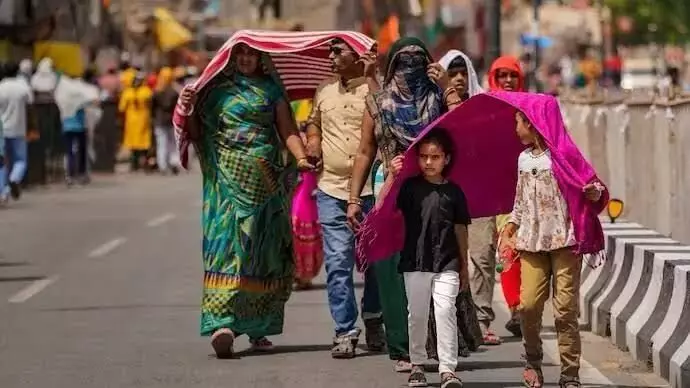Unseen Heatwave: Surge in illnesses across Hyderabad as humid nights prevent body from cooling
Hospitals across the city have reported a rise in heat-related symptoms
By Anoushka Caroline Williams
Unseen Heatwave: Surge in illnesses across Hyderabad as humid nights prevent body from cooling
Hyderabad: Over the past week, Hyderabad has been caught in a stretch of persistent heat and humidity. Even though the monsoon has arrived, daily temperatures have stubbornly hovered around 31–32°C during the day, and nights have remained uncomfortably warm at 23–24°C.
These numbers might not seem extreme by summer standards, but the real discomfort lies in the combination of heat and high moisture in the air, which prevents the body from cooling down effectively, especially at night.
This kind of unrelenting warmth, especially without cooler nights, is proving to be more than just uncomfortable. It’s quietly affecting people’s health, increasing the number of cases in local clinics and hospitals.
What doctors are seeing right now
Hospitals across the city have reported a rise in heat-related symptoms. Doctors are seeing patients come in with:
• Unusual fatigue, even without exertion
• Headaches and nausea
• Muscle cramps, especially in the legs
• Light-headedness and fainting spells
• Irritability and loss of appetite
• Dehydration symptoms, even in those drinking water regularly
While these may seem like minor complaints at first, they’re all early signs of heat stress, a condition where the body begins to lose its ability to regulate temperature.
Dr Pranjanli Verma, a general physician based in Banjara Hills, shared her recent experience: “I’ve had at least 4–5 patients every day this week whose primary issue was just ‘not feeling well’, and after checking vitals and symptoms, we traced it back to prolonged heat exposure and dehydration.”
Why does this heat feel worse than it is
What makes this spell particularly dangerous isn’t just the temperature; it’s the lack of recovery time.
Normally, after a hot day, cooler nights help the body rest and regulate. But Hyderabad’s current night temperatures have remained high, especially in the concrete-heavy city centre, thanks to what’s called the urban heat island effect. This traps the day’s warmth in buildings, roads, and pavements, releasing it slowly through the night and giving people’s bodies no real break.
Add to that high humidity levels, and you get what meteorologists call a “wet-bulb effect.” In simple terms, it means even sweating stops helping, because there’s too much moisture in the air for it to evaporate. Without this basic cooling mechanism, the body starts to overheat internally.
Who’s being affected the most
According to healthcare professionals and local observations, the most vulnerable groups right now include:
• Children and infants, whose temperature regulation systems are still developing
• Elderly people, especially those with heart, lung, or kidney issues
• Outdoor workers, including delivery personnel, construction workers, and hawkers
• People with lifestyle diseases like diabetes or high blood pressure
• Individuals living without proper ventilation or access to cooling devices
Even those who mostly stay indoors, such as remote workers and students, are reporting exhaustion, skin rashes, and headaches after just a few hours of exposure in poorly ventilated rooms.
When heat triggers more than sweat
While the visible impact of heat is easy to spot, sweat, sunburn, and tiredness, some of its deeper effects are less obvious:
• Mild dehydration, repeated daily, can slowly reduce kidney efficiency
• Poor sleep from hot nights affects mood, memory, and productivity
• Excess heat can thin the blood, which in people with heart conditions can lead to complications
• Mental fatigue increases with heat, especially in those with anxiety or mood disorders
How to stay safe: Practical advice for this week
Doctors recommend the following precautions, especially while the city remains stuck in this humid heat trap:
1. Increase your water intake, even if you don’t feel thirsty. Add salt and lemon once a day to restore electrolytes.
2. Use curtains or reflective sheets to block out direct sunlight during the day.
3. Avoid stepping out between 11 am and 4 pm unless absolutely necessary.
4. Don’t rely only on fans; they circulate warm air. Use damp cloths or sponge baths to cool your body.
5. Monitor elderly family members, young children, and pets; they may not report discomfort until it’s serious.
6. Switch off heavy electronics in closed rooms, laptops, TVs, and even Wi-Fi routers add to indoor heat.
If you or someone around you shows signs of dizziness, confusion, rapid breathing, or muscle weakness, don’t ignore it. Get them into a shaded, cool place and offer small sips of water. If symptoms persist, seek medical help immediately.
Is this the new normal?
Climate scientists have long warned that humid heatwaves are becoming more common in tropical cities like Hyderabad. These are different from the dry heatwaves of North India, and arguably more dangerous, because the body has fewer ways to cool itself.
As cities grow vertically and green cover shrinks, built-up spaces retain heat for longer. Combined with rising global temperatures, Hyderabad may see more weeks like this, not necessarily with record-breaking highs, but with unrelenting discomfort.